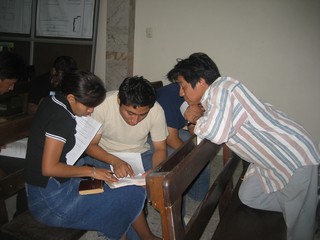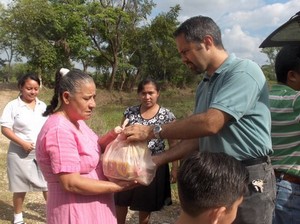
I just finished up another evangelism conference, this marking my sixth opportunity to hold such an event here in the Yucatán. With more experience comes more confidence in sharing the material, but that experience also brings a certain familiarity with the topic–an anticipation you could say of the inquiries and the reaction of the audience, but during class this last Thursday, a question was asked that I hadn’t anticipated.
We had been studying Mark 6:30-44, the account of the feeding of the 5,000, and contrasting the disciples’ reaction to the crowd’s needs with that of Jesus. Analyzing the context, we concluded that the disciples’ inaction and Jesus action was related to a key element, compassion. Jesus saw the plight of the crowd and the compassion that he felt moved him to action even though he was in the midst of extreme personal sorrow. The disciples, coming off of a successful preaching tour, failed to react because their lack of compassion.
Usually, the anticipated question is “How do we learn to react in the way Jesus did?” a question that I anticipate and answer within the lesson follow-up, but this time an unanticipated question was raised; a student asked: “Should we act compassionately first and then preach, or should we preach first and then display acts of compassion?” Caught off guard, I had to think a bit about the question. I wanted to know what it was that this student was trying to clear up in his mind. His clarification clued me in. Some organizations emphasize compassionate acts, feeding programs, rehabilitation centers, and medical clinics while others emphasize teaching and preaching engagements. This student was trying to understand what stance we should take in the debate between presenting evangelism as a moment of decision or what what some call the “social gospel.”
The question illustrates the danger of thinking in predefined categories. It can cause us to limit our outreaches to traditional activities like preaching, teaching, and passing out tracts while avoiding food distribution or medical clinics in an attempt to show our emphasis on “telling the good news,” or it can cause us to add mandatory evangelistic events to our “social outreach” in order to justify the undertaking, a practice that can lead others to criticize us as evangelicals for opportunistic proselytizing, or can lead to the phenomenon of “Rice Christians,” those who confess Christianity as long as the hand outs keep coming.
Separating compassion and preaching/teaching into separate categories should make us ask the questions: “Is our preaching without compassion?” and “Is social outreach condemned or considered second-class by scripture?” Obviously the answer to both questions is no. The real question, therefore, should not be, “How should our evangelism look?” but rather, “How should our evangelism be motivated?”
Returning to the passage in question, we see that Jesus taught and fed the needy crowd. There was no separation of his actions into evangelistic and social. Rather compassion motivated him to meet the need before him. Jesus wasn’t checking off items on his list; he was instead showing us that the compassionate response considers its recipient as a whole person.
Interchanging the word compassion for love can perhaps clarify the point. Paul, in trying to settle church division in Corinth, culminates his argument for unity with the famous love chapter of 1 Corinthians 13, which he introduces as “the most excellent way.” In his opening words, he lists both “spiritual” (prophesy and tongues and the practice of faith) and “compassionate” (giving to the poor) acts as worthless without love. It’s little wonder then that 1 John 4:12 says that we would be known to be true, not for our excellent Bible teaching or for our hospital building, but rather for our love, and this is fitting because love when perfectly applied led to eternal life. (Jn 3:16)
Reaching out to a lost world in love then enables us to push past the categories and throw away our checklists. Ultimately it allows us to utilize the appropriate means to communicate God’s love, be it through a cup of cold water or an offer to pray the sinner’s prayer.
Learning and encouraging the most excellent way here in the Yucatán,
Dave





